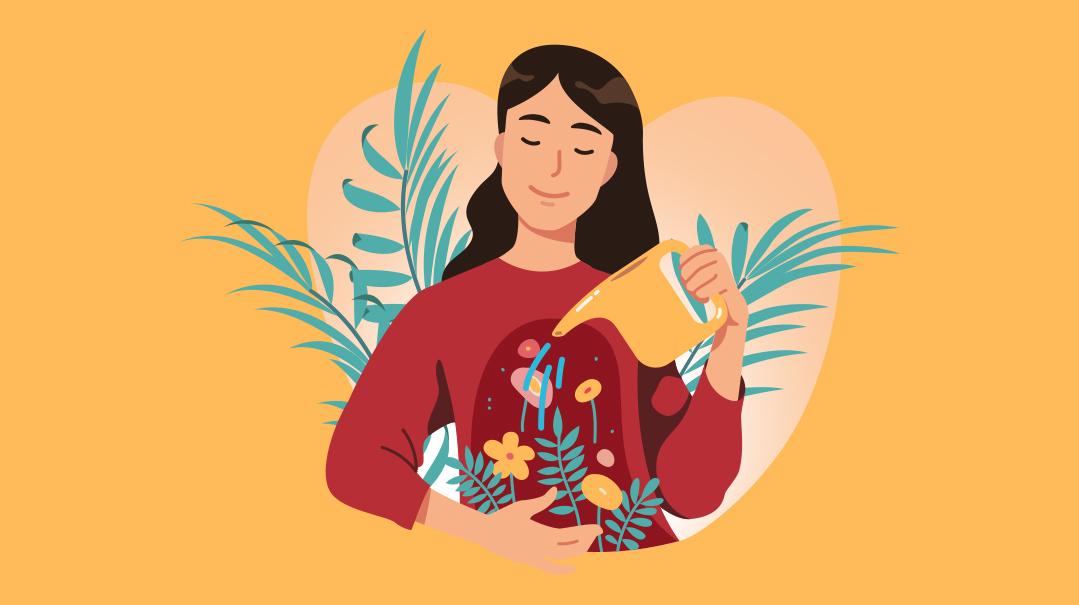Love Thyself

How to silence the constant critic perched on your shoulder

This article is about you. And me. And all those of us harboring a constant, flagellating critic that sits on our shoulders. And it’s going to teach us how to silence that voice and feel love — for ourselves, and by extension, for others and for Hashem.
IF
you’re reading this article, then here’s everything I know about you. You most likely have a warm, sensitive heart thudding in your ribcage, and a magnificent, intelligent brain sitting snugly between your ears. And it’s (very) possible that in the last few days you looked in the mirror and criticized, shamed, or judged the person staring back at you. (And if you didn’t, not even once, I’d very much like to meet you.)
Welcome to life. Where some days are a joy and others are jarring. But everything changes when you have the most supportive, accepting, and compassionate person to live it with.
Yourself.
This article is about self-love.
This article is about you. And me. And all those of us harboring a constant, flagellating critic that sits on our shoulders.
Self-love is a topic that’s been on my mind for the longest time as I coach more and more women who are on a hamster wheel of toxic productivity, chasing goals and delivering meals — all while feeling it’s never enough.
Self-love?
What is self-love? What does it actually mean, why does it actually matter, and how can we integrate this healing and holy idea into our daily lives?
Let’s start with what it’s not.
Self-love isn’t about self-absorption. Self-love doesn’t mean being blind to our faults. Self-love isn’t arrogance. Self-love doesn’t mean prioritizing me, me, me.
Self-love means treating yourself with kindness and compassion. Why? Because you’re a soul Divinely cherished by a loving Creator.
It’s not a new-age concept; it’s an ancestral calling.
From Hillel Hazakein’s famous Im ein ani li, mi li? and of course, V’ahavta l’reiacha kamocha, the message is clear. Loving thyself is a pretty big deal.
Ugh, Naomie. You may be rolling your eyes. I’ve heard this tens of times.
Well, bear with me as we explore deeper.
Learn about Yourself
We’re in This World for one reason. To create a relationship with Hashem. Sounds simple, right? Well, not quite, because as Rav Wolbe ztz”l teaches, serving Hashem requires that we deeply know who we are.
No. That’s not discovering your favorite food or analyzing your taste in music. It’s getting real about who you are and what drives you. It’s understanding all 30 triggers that flare at the annual Chanukah party. It’s owning your strengths and also opening your eyes to the uglier side that exists within all of us.
To experience a rich connection with Hashem, we first need to wake up to the gadlus of our neshamah. That unshakable, enduring worthiness each of us possess, just by virtue of our existence in This World.
Read that again. You’re worthy simply because you exist.
But so often we find ourselves chasing ever-changing success markers so that we can feel a sense of self-worth. How many times have you told yourself, “When I get my degree, have a certain income, weigh a certain number, drive a certain car… then I’ll be happy”?
Let’s go on a journey through time, when you were a pure, precious, sweet baby. You ate, burped, and pulled your toes, and there was nothing you needed to do to be worthy of love. You were loving and trusting and joyful and curious, and also had a strange affinity for eating dirt.
And then… you grew up. Went to school, weren’t invited to that birthday party, failed at math, fell out with your bestie, got on your big sister’s nerves, and subconsciously began absorbing beliefs about yourself and the world. You may have internalized messages that followed the equation: I’m not good enough unless X. Or, I’m only liked if Y. And this all means….
I’m not worthy of love and respect.
It’s so subconscious and sneaky. And it may be why as grown adults we find ourselves taking on too many commitments, people-pleasing, hustling and bustling, losing sight of our deepest priorities, living passively, eating our feelings, and beating up on ourselves for never being, doing, earning, having enough.
But here’s the thing. We are goodness. This is our essence. Your soul is a piece of Hashem. I mean, it doesn’t get better than that. The yetzer hara, on the other hand, masquerades as a critical, negative voice in our head. It’s so good at its job, sending a stream of negative chatter from your brain, that it can literally drown out the whispers of goodness flowing from your soul. The messages from your heart that quietly and consistently assert: I’m good. I’m enough. I’m okay.
Ahavah rabbah ahavtanu. Hashem loves us unconditionally. That means there’s no condition in the world that can change His love for you.
There’s nothing you can do or not do that will change that. Let that sink in. But while it sounds beautiful, in reality, we may flow through life with an inner commentary that sounds like:
I’m such a bad daughter, I can never get my act together.
Ugh, I just burned dinner. Again. Note to self: Do not leave stir-fry on a high flame unattended.
What was I thinking leaving the kids alone with glitter glue? Disaster.
I shouldn’t have eaten those cookies. Ugh, zero self-control.
When will I learn to just put my keys where they belong? Stupid.
And on and on and on and on.
When our friends approach us nervous, worried, or upset, we’re lightning quick to support them and offer our reassurances:
It’s totally not your fault!
That is sooo normal, it could have happened to anyone!
You’re doing the best you can!
Don’t be so hard on yourself!
How could you have known? It makes sense to make mistakes.
You’re amazing, and don’t you forget it!
I love your sweater; you’re always so put together.
Ironic. No?
Somehow, when it’s our own foibles and faults, we believe we should have known better,
tried harder, done more. We think exacting personal standards will keep us on our toes, when in reality we become physically exhausted just by being in our heads. (That’s real science, by the way.)
Now I hear you hardcore self-critics in the back. But if I don’t criticize myself or feel guilty, I won’t grow. I won’t improve. Doesn’t Judaism call for striving? Being nice and kind and sweet to myself when I accidentally say lashon hara won’t move the needle. The only way we can truly change and grow is to thoroughly beat up and criticize ourselves.
But there’s a better way.
Shaming and blaming ourselves into lasting change just doesn’t work. (And before I get notes in Inbox, let this not be confused with the gems of mussar that we should — nay, must — make an integral part of life. Don’t drop that. Drop the blame game and guilt trips. We clear?)
The Way to Love
Let’s go back to the pasuk, V’ahavta l’reiacha kamocha. And this time we’re going to read it a little differently: V’ahavta l’reiacha, kamocha.
Says Shira Savit, nutritional counselor and integrative health practitioner, “See that love you so effortlessly extend to your friend? The way you reassure her when she’s worried, or comfort her when she’s in pain? The compassion, kindness, and understanding that flows so easily when we support our friends is exactly the kind of self-love Hashem wants us to extend to ourselves.”
How can we draw from Hashem’s unconditional love from us, and infuse more serenity and expansiveness into our lives? By offering ourselves a voice of inner compassion. Which in simple terms means looking in the mirror and remembering that you are… human. Just the way Hashem wanted you. Achingly imperfect and magnificently divine. Oh, and with some spinach in your teeth. (Kidding.)
The most graceful, wholehearted woman I can think of is the woman who forgives herself over and over. The woman who accepts herself on the days with no makeup and slinky skirts as still being good enough. The woman who notices the stream of negative chatter and watches it from afar with amusement and curiosity. The woman who takes time to be kind to herself. The woman who messes up, takes a deep breath, and instead of spiraling, calmly commits to doing better. The woman who has high ambitions and realistic expectations. The woman who gets up again and again because she makes the decision to believe that she is worthy.
Chana recounts, “It was a long summer. My kids were home, I was working, and there was no camp. I love these tiny humans, but we had some hard moments. And sometimes I totally lost my cool. The old, self-hating me would have immediately turned inward, berating myself. Who needs your work, anyway? Don’t you realize these are precious neshamos? What’s the matter with you?
“I’d blame and shame myself like a champion, and my kids were left with a moody mommy. Self-love is when I can observe the scene instead of berating. I can take action instead of beating myself up.”
It’s so easy to fall into black-and-white thinking, where we’re either good or bad. Growing or falling. And this is the trap that we want to slowly bring awareness to. Oh, I’m doing that thing again. The one where I’m either exclusively bad or angelically good.
Let’s take emotional eating as an example.
You want to lose 20 pounds. Yesterday. But your niece’s wedding next month is the next target. It all started when you looked in the mirror and shuddered at your reflection. Unacceptable, you thought. Next thing you knew, you had booked a gym membership and splurged on a month’s supply of unsweetened Greek yogurt. Your pumped motivation fueled you for a day or two as you chewed on celery sticks and fried up a white omelet — your third that morning. But then… then you had one little cookie at the neighbor’s bar mitzvah kiddush. And you felt guilty. Very guilty. So guilty, in fact, that you had no choice but to eat another five petit fours to make that feeling go away. And sneak a few more into your purse for later. For the children, of course. You got home and spiraled your way into a binge fest, drained, exhausted, and frustrated.
Self-love is in the gray. Self-love is taking a look and saying, Oh, I ate a cookie, something inside of me really needed this, huh. That doesn’t make me feel great. I love myself enough to understand that this happens because I’m imperfect. And I won’t shame and judge myself for being human.
When we can talk to ourselves like this, we move into this wonderful gray area. And being gray means we have more space to see what’s driving us within and to offer it understanding — not so that we can condone behavior we aren’t proud of — but so we can make empowered choices toward lasting change.
Let’s be super clear. Self-love doesn’t mean waving a magic wand and forgiving yourself for all your shortcomings. It’s meeting yourself with understanding moment after moment; you’re simply human. A human striving for growth and connection and ruchniyus.
There will be times when your desire to shame yourself into change flares up. You’ll have dark moments. We all do. Why, in the past few weeks, I’ve swung up and down multiple times a day. Did I say day? I meant hour. Oops.
But your feelings and perceptions don’t change the truth of what is. You deserve kindness.
A Gesture
Sometimes, words can feel hollow and empty. You might cognitively know Hashem loves you, but in the moment, it feels like everything is negative. You may want to approach yourself with understanding and kindness, but saying things like, “I’m a good person,” or “I’m loved,” feels cliché and hollow.
And that’s when we want to bring in gestures of love. A hot cup of tea. A sweet square of dark chocolate. A hand on your heart. A hug to yourself. A walk in nature. A whiff of lavender oil. Cupping your face in your hands and just breathing into your feelings.
On days when I’m down and things feel sluggish, I’ll look in the mirror and ask myself, “Naomie, how can I support you today?” and that message means the world to me. To know that I’m there for me is everything. Because who will be there for us, if not ourselves?
Says Yehudit, a mother of four playful kiddos, “I have major social anxiety and used to feel like the awkward tagalong in social situations. I would put on appearances to be someone I wasn’t and hated myself for it. My journey of self-love was gradual and culminated in my 30th birthday when I finally realized nobody is thinking about or judging me, and if they are, well then, I don’t want to be friends with them either.
“One night, while making my kids’ lunches (again), I realized that even if I’m bombed, my kids need to eat, and I won’t skip prepping food for them. So why do I do that to myself? Loving myself doesn’t come naturally. Loving my kids does. So to me, having self-love means doing things that demonstrate the respect I have for myself.”
Simply being in a state of peace and serenity, showing kindness to ourselves, is foundational. But it’s not the full picture. We’re each a tzelem Elokim, made in the image of our Creator. And to some degree we’re endowed with the ability to be creators.
We understand that we’re designed to both be and become. You’re a human being here to actualize your potential, which is… UNLIMITED.
Our goal is to create a foundation of self-love, peace, and serenity so that we can power the very real need to express ourselves. Says Adina, a freelance graphic designer, “To me, self-love comes in when I want to have a space outside of my home and identity of being a mom, wife, employee. I’ll connect socially and do things I enjoy, so I can come back home with a full bucket. I believe if you only play one role in life you aren’t tapping into every facet of your being.”
If I want you to walk away with one message, it would be this: You are good enough. You are human. You are loved. Can you lean in to the truth of that and let it fill you up?
Yes, you can still strive, hope, conquer and achieve. But do it from a place of compassion, understanding, and gentleness. No, not every moment will be perfect and glowing. But every moment will be an opportunity to emulate Hashem by being there for yourself, with yourself, with kindness and understanding.
The more we do that, the stronger and softer we will become; the more space and strength we will create to go out there and be the biggest version of ourselves in the world. Isn’t that G-dly?
The concepts in this article were heavily influenced by the wise and loving voice of Shira Savit, nutritional counselor and integrative health practitioner, who empowers so many women in klal yisrael.
(Originally featured in Family First, Issue 867
Oops! We could not locate your form.






